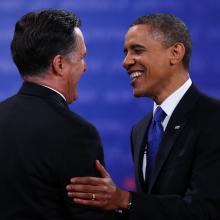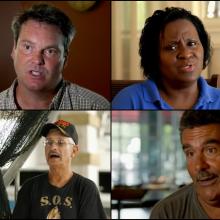romney
Generally, we only know how history will be remembered once it is in the rearview mirror. Something, or some things, jump out and remain indelible in the collective memories of the culture. And in a world defined by sound bytes, sometimes only a few words tell us a lot about that moment in time.
In that spirit, here are my selections for the ten most defining phrases that will stay with us from the past year.
I DON'T WANT to keep harping about this climate change thing, but someone has to have the singular courage to stand up for the future of our globe. Someone, I mean, besides 98 percent of the world's climate scientists, the governments of every other industrialized nation, and millions of people around the world. Not counting those, I am that man.
Because I have seen the future of a warming planet, and it's not just fraught with melting glaciers and rising oceans. It's also got stink bugs.
Twice a year, Sojourners' editors and its highly esteemed art director drive to a cabin in the mountains of West Virginia to plan future issues. (I will pause briefly for Colorado readers to stop laughing convulsively at the suggestion that hilltops a few hundred feet above sea level can be called "mountains." But if I get carsick on the drive up, I'm calling it a mountain.)
After we arrived this fall—and my stomach finally calmed down—we settled into our usual method of magazine planning: a rapid-fire brainstorming of ideas both provocative and ground-breaking, but not so much that it keeps me awake. Then came the first telltale tapping sounds from the window.
A half-dozen stink bugs had gathered on the inside of the pane, with a dozen more on the outside, all of them repeatedly bumping into the window, unable to decide on one plan of action. But enough about Mitt Romney.
FATHER JACK MORRIS was one of those Catholic priests who ruined a lot of people for life. I'm one of them.
Father Morris passed away Sept. 30 in Spokane, Wash. He was working with the Catholic sisters and others who ran the highly regarded Copper Valley School in Alaska in the late 1950s when he took the idea of young people volunteering their time with and for Native Alaskans and helped turn it into the Jesuit Volunteer Corps. Since then, more than 12,000 people have served in the JVC, whose motto "ruined for life" reflects the fact that voluntary service often makes enduring changes in the way participants view the world. (A few years ago, Father Morris told Sojourners that the motto is "a resurrection statement"—through volunteering, he said, "you're transformed.")
I spent my first two years after college as a Jesuit Volunteer, first at the Oregon Center for Peace and Justice in Portland and then at Georgetown University's Center for Peace Studies. My mentor and boss in Portland was the center's director, Sister Michele Phiffer. She worked for years helping Catholics in Oregon understand the church's social teaching on the common good and the preferential option for people who are poor.
Perhaps needless to say, the local bishops weren't always on her side. In fact, it often appeared—even to my young eyes—that the bishops were more interested in protecting their own privilege and power than in genuinely working for the marginalized. And Sister Michele's gender seemed to be a factor in the lack of support she received from the episcopal powers that were.
In the wee hours of Wednesday morning, we learned that President Barack Obama would remain the leader of the free world. But his victory came at a price. He and Governor Mitt Romney now have the honor of participating in the most negative election in United States history.
“The campaign has already set records for nastiness and negativity,” Senator Joseph Lieberman commented to CNN in August. Howard Fineman echoed the sentiments on the Huffington Post, calling it “the nastiest, most abrasive personally accusatory presidential campaign in modern times.”
It’s hard to argue with their assessments, but does anyone care? And if so, what are we going to do about it?
Every campaign has a measure of negativity, but 2012 was exceptional.
Every campaign has a measure of negativity, but 2012 was exceptional. Mudslinging became an art form, and the lack of truth-telling turned “fact-checking” into a cottage industry. At one time in this country, disagreements could be settled by a good old-fashioned duel. (If you don’t believe me, ask Aaron Burr.) But in the media age, guns are no longer necessary. We have commercials.
The campaigns unleashed roughly 1,000,000 television ads during this election, and a record four out of five were negative.
SALT LAKE CITY — Mormons in Utah and across the nation were thrilled by the prospect that one of their own might occupy the highest office in the land.
That won’t happen now. But Mitt Romney came closer than any other Latter-day Saint since that once-beleaguered brand of Christianity burst onto the American scene in 1830.
"For many Latter-day Saints, it was a surprise that a Mormon candidate was able to make it as far as Mitt," said Stuart Reid, a Mormon and a Republican state senator from Ogden, Utah. "He’s done more than any single person in recent church history to share with the general public what a Mormon is, putting up a very positive image about Mormons and creating interest in our faith that was unprecedented."
Despite the defeat for Romney, Mormonism came out a winner, said Philip Barlow, chair of Mormon history and culture at Utah State University.
"It developed a thicker skin in the eyes of the world," Barlow said, "and the world could see that a Mormon who runs for office isn’t, by definition, a nut case."
Overall, most observers say, the Romney candidacy was a net positive for his Utah-based faith.
Breaking a1e longstanding personal pledge, Southern Baptist leader Richard Land has endorsed GOP presidential nominee Mitt Romney, saying next week's election is the most important since Abraham Lincoln's win in 1860 and he can no longer stay silent.
“America is at a fork in the road and must choose between a President Barack Obama who wants to remake America in the model of a European welfare state and a Governor Mitt Romney who wants to restore a more economically vibrant and traditionally moral America,” Land wrote in an Oct. 26 column in the Christian Post.
Land, who is executive editor of the independent Christian Post and the top public policy spokesman for the SBC, said the “stark and revealing” differences between the Republicans and Democrats on abortion rights and same-sex marriage guided his decision.
“For Christians of traditional religious faith, there cannot be more fundamental issues than the protection of the sanctity of all human life from conception to natural death and the defense of marriage as a divinely-ordained institution between one man and one woman,” he wrote.
Land’s endorsement comes just as Romney's campaign has been trying to cast the candidate in a moderate light by downplaying the Republican’s views on abortion and gay rights and saying voters should not expect him to take significant action on those social issues if he is elected.
The largest slice of President Barack Obama’s religious coalition -- at 23 percent -- is not very religious.
They’re the “nones,” also known as unaffiliated voters, according to a new American Values Survey by the Public Religion Research Institute.
Gov. Mitt Romney’s biggest bloc of religious voters are white evangelical Protestants, at 37 percent, followed by white mainline Protestants and white Catholics, each at 19 percent. Comparing the candidates' supporters, the more diverse religious and nonreligious coalition that's favoring Obama tends to be younger and growing, which could make it easier for Democrats to win elections in the future.
But there’s a down side for Obama, said Dan Cox, PRRI’s research director.
“The people most likely to support him are the least likely to vote: Latinos, the millennials (voters 18-29), and the unaffiliated,” Cox said.
More American Catholics believe their religious leaders should be focused on issues related to poverty and social justice during this election season, rather than spending time and energy on other issues such as abortion, according to a new survey released this week by the Public Religion Research Institute.
The results of the 2012 American Values Survey demonstrate that American Catcholics -- and the "Catholic vote" -- is far from the monolith some politicians might like to believe they are.
"The survey confirms that there is no such thing as the 'Catholic vote,'" Robert P. Jones, CEO of PPRI and co-author of the report, told Reuters. "There are a number of critical divisions among Catholics, including an important divide between 'social justice' and "right to life' Catholics."
For instance, on the question of the public engagement of the church, the 2012 American Values Survey found important divisions between Catholics who prefer a “social justice” emphasis that focuses on helping the poor and Catholics who prefer a “right to life” emphasis that focuses on issues such as abortion.
The Romney-Ryan ticket is the first Republican presidential campaign in history without a Protestant candidate, but this hasn't deterred evangelicals from launching massive get-out-the-vote and registration efforts to help Mitt Romney and Paul Ryan win the White House.
Faith and Freedom Coalition founder Ralph Reed, who has been involved in pushing evangelicals to the polls since 1988, has launched what he described as the "largest voter registration, voter mobilization and get-out-the-vote effort ever targeted at evangelical voters," specifically those who would be new additions to the voter rolls.
Reed's effort targets not only presidential swing states but also those with critical Senate and House races to help elect conservatives down ballot as well.
Working with third-party contractors, Reed and his group were able to identify and mail voter registration packets to slightly less than 2 million unregistered evangelicals based on everything from Census data to television preferences to what books they may have purchased online.
"There are millions of Bibles purchased in the United States every month. Most people aren't interested in finding out who is buying those Bibles — I am," Reed said.
Reed said he has a voter file of 17 million evangelicals in battleground states, and each household will be contacted seven to 12 times before the election through mail, email, phone calls and text messages.
Why, exactly, does it matter if President Barack Obama gave a lackluster performance in the recent presidential debate?
These quadrennial campaign sideshows have nothing to do with one's capability, preparation, aptitude or suitability for the presidency.
Why does Gov. Mitt Romney's spirited performance matter? What does a “victory” by one candidate mean, other than momentary bragging rights?
Surely we know that these debates are about as meaningful as an Oscar winner's thank-you speech. What we want from a president is a steady hand in dealing with a wicked and wayward world, a collaborative spirit in bringing a broad reach to government, and a magnanimous spirit in consoling war widows, helping victims of disaster, protecting the weak from the relentless predations of the strong, and trying to preserve an “American Dream” to which all, not just a few, are invited. We want signs of character, not a telegenic mien.
Presidential debates are like first visits to possible in-laws. You hope not to belch at supper — and then you return to the world where you are actually exploring marriage and building a life.
OK, the @firedbigbird tweets have been hilarious.
And it's almost understandable that America has given so much attention to the Big Bird comments from Tuesday's debate. (@Firedbigbird had more than 31,000 Twitter followers as of late Friday afternoon.)
I mean, Romney's comment was definitely a "zinger."
We get it. It's funny. But come on.
On Thursday, Public Broadcasting System (PBS) CEO Paula Kerger talked to CNN about the issue, and she couldn't believe the iconic children's TV star has gotten this much attention either.
Many people in America are poor, due to no fault of their own—and their numbers are growing.
If you really know any poor people, you know that to be true. If you don’t, the first sentence of this post runs against the grain of many cultural assumptions in America that tend to blame people for being poor.
On the eve of the first Presidential debate, Sojourners premiered The Line — a film about the new faces of poverty in America. In this powerful documentary from award-winning filmmaker Linda Midgett, those popular judgmental assumptions against poor people clearly and convincingly are debunked.
The Line, which I am asking everyone who reads this column to watch, deftly dismantles many stereotypes about poverty and shows why a growing number of Americans find themselves falling into it. The film does so by telling the personal stories of people who have fallen beneath “the line.”
My 14-year-old son Luke, watched the story of John: a banker from a failed bank who once made a six-figure salary, but who now finds himself a substitute teacher making $12,000 a year while trying to raise his three kids. John painfully talked about what it feels like to have to go to a food bank because he has no other viable choice.
His story caused Luke to ask his mom after the film, “John said he got straight A’s in school, so could that happen to me?”
SALT LAKE CITY — A Mormon blogger accused of apostasy for writing critical web essays about Mormon history, temple worship and contemporary issues, has been given a reprieve — for now.
The church disciplinary council set for today (Sept. 30) to decide whether to excommunicate David Twede has been postponed "due to scheduling conflicts," Allan Pratt, Twede’s LDS stake president in Florida, said in a statement Thursday. "It will be rescheduled for a later date."
Twede is managing editor of MormonThink.com, where most of his critical pieces, including ones about GOP presidential nominee and fellow Mormon Mitt Romney, have appeared.
On Sept. 16, officials in the church's Hunters Creek Stake in Orlando, Fla., gave Twede a letter, summoning him to a church disciplinary council for "apostasy," which they attributed to his writings.
Mitt Romney angered evangelicals during his first White House run in 2008 by blurring the theological lines between their faith and his Mormonism. Lurching in the other direction, he irked them again by scarcely mentioning religion at all during this year’s GOP primaries.
But Romney has finally found some middle ground, evangelical leaders say, by sidelining theology and stressing the “Judeo-Christian values” that he shares with social conservatives.
“He’s made it very clear not to gloss over the theological differences that his faith has with evangelicals,” said Tony Perkins, president of the conservative Family Research Council in Washington. “As long as he talks about the shared values of our religious traditions, I think he’s good.”
Romney did exactly that during a Sept. 9 Meet the Press interview, saying that religion inspired him to run for president — without mentioning the word “Mormon.”
“The Judeo-Christian ethics that I was brought up with -- the sense of obligation to one’s fellow man, an absolute conviction that we are all sons and daughters of the same God and therefore in a human family — is one of the reasons I am doing what I’m doing,” he said.
Conservative Christian leaders are taking the same approach, urging evangelicals to focus on Romney’s policies and principles, not the particulars of his faith.
President Obama’s support among Catholic voters has surged since June, according to a new poll, despite a summer that included the Catholic bishops’ religious freedom campaign and the naming of Rep. Paul Ryan, a Catholic, as the GOP's vice-presidential candidate.
On June 17, Obama held a slight edge over Mitt Romney among Catholics (49-47 percent), according to the Pew Research Center. Since then, Obama has surged ahead, and now leads 54-39 percent, according to a Pew poll conducted on Sept. 16.
Among all registered voters, Obama leads Romney 51-42 percent, according to Pew.
Obama and Romney are essentially tied among white Catholics, which some pollsters call the ultimate swing group.
On Sept. 24 Romney unveiled his Catholics for Romney Coalition, which includes numerous politicians, beer magnate Pete Coors and Princeton University intellectual Robert P. George. The Obama campaign also has a Catholic coalition.
A Mormon blogger who has written critical web essays about Mormon history, temple worship and contemporary issues — including about GOP presidential nominee Mitt Romney — is facing church discipline for “apostasy.”
Initially, the Florida blogger, David Twede, managing editor of mormonthink.com, told news media Sept. 21 that the threatened church action was due to his comments about Romney. Later that day, he denied any political link. Then, on Saturday, he returned to “a feeling in (his) gut” that his Romney remarks triggered the possible discipline.
Twede did get a letter from his Mormon leaders in Orlando, summoning him to a disciplinary council Sept. 30 for “apostasy,” which they attributed to Twede’s writings.
In recent days, the blogger has blasted Romney as part of his critique of Mormonism, its beliefs about the nature of God and its temple ceremonies.
But, Twede told The Salt Lake Tribune on Friday, his LDS leaders never brought up Romney, a Mormon, in their exchange with him. Though not supporting the Republican nominee, Twede apologized to Romney, saying, “I didn’t mean for (the story) to go this way.”
The white working class, a potentially rich bloc of voters for Republicans or Democrats, hasn’t settled on Mitt Romney or President Barack Obama, a new study from the Public Religion Research Institute shows.
“These white working class voters are not particularly enamored of either candidate,” said Daniel Cox, PRRI’s research director. “In terms of their favorability, they’re both under 50 percent.” Forty-four percent look favorably upon Obama and 45 percent upon Romney.
Released seven weeks before the election, the August survey found Romney with a double-digit lead over Obama among the white working class, which preferred the GOP candidate 48 to 35 percent.
But Cox points out that the gap narrows to statistical insignificance among women voters in this group, and in the Midwest and West, home of several swing states. The upshot for Romney and Obama?
If they want to woo this group, which makes up 36 percent of the nation according to the study, the campaigns may want to consider other findings of the PRRI poll.
Mitt Romney has an evangelical problem. Or so we’ve been told by everyone from The New Yorker to The Huffington Post to The Daily Beast. The national media have perpetuated this narrative throughout the election season, and political pundits aplenty have assumed its reliability in their columns and commentary.
But there’s one glaring problem with the storyline: It’s not true.
“Evangelicals say they want a presidential candidate who shares their religious beliefs and they still hold that Romney’s religion is different from their own,” says Robert Jones, CEO of the Washington-based Public Religion Research Institute. “And yet as early as May 2012, shortly after it became clear that Romney was the presumptive nominee,Romney held a 45-point lead over Obama" among evangelicals.
We’ve been told that evangelicals were so skeptical of Romney’s Mormon faith they might not be able to pull the lever for him in the voting booth. But according to Jones’ research, as more white evangelical voters have realized that he is Mormon, his favorability among them has actually risen.
Family Research Council President Tony Perkins said Sept. 12 that conservative Christians are growing more enthusiastic about GOP presidential nominee Mitt Romney, and predicted they would show up at the polls in record numbers in November.
"When it comes to the values of family, values of faith, values of freedom, Mitt Romney is a clear choice, I think, for value voters across this country," Perkins said at a National Press Club luncheon two days before his organization kicks off its annual Values Voter Summit in Washington.
Perkins, a Southern Baptist, said evangelical Christians have "significant theological differences" with Romney, a Mormon, but he said the GOP nominee, if elected, would not be asked to head a national church.
"We don't want a national church. We want religious freedom," he said. "I think someone who has been a part of a persecuted religion is going to be even more sensitive to the issue of religious freedom."
More than two dozen Christian conservatives are trying to put theological debates about presidential candidate Mitt Romney's Mormonism to rest by focusing on the policies outlined in the GOP's new national platform.
In a letter delivered Sept. 7 to Romney the leaders acknowledged that some conservatives have “tempered their enthusiasm for sound governing principles by their concern over differences in a candidate’s theological doctrine.”
But, the leaders said, "it is time to remind ourselves that civil government is not about a particular theology but rather about public policy."
Signatories of the letter include the two sons of the late Jerry Falwell, leading Catholic anti-abortion activist Rev. Frank Pavone, and GOP strategist Ralph Reed. Polls repeatedly show that, while most social conservatives favor Romney, nearly a quarter still express discomfort with his Mormon faith.















![The Salt Lake Temple worship site. RNS photo by Carol M. Highsmith [Public domain] via Wikimedia Commons RNS photo by Carol M. Highsmith [Public domain] via Wikimedia Commons](https://sojo.net/sites/default/files/styles/medium_square/public/blog/thumbRNS-MORMON-NUMBERS050412a_0.jpg?itok=KRwWmank)



